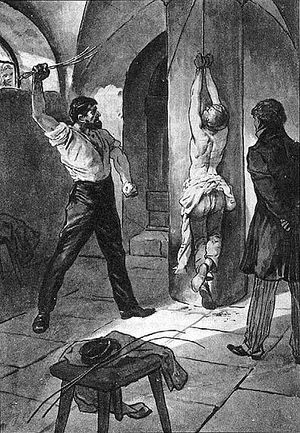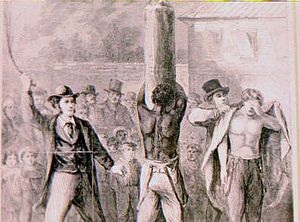Judicial corporal punishment

Judicial corporal punishment is corporal punishment of convicted criminals. It was common in many cultures throughout history since antiquity. In the 19th and 20th century, practically all industrialized countries abolished judicial corporal punishment; places where it is still common today (as of 2006) include Caribbean, African, Middle Eastern, South Asian, and Southeast Asian nations. In Islamic countries, judicial corporal punishment is usually based on and regulated by Sharia law.
Description
Judicial corporal punishment is by definition nonconsensual and therefore quite different from consensual forms of adult corporal punishment such as erotic spanking, BDSM or domestic discipline.
Most judicial corporal punishment consists/consisted of whipping, birching or caning the delinquent on his/her bared back and/or buttocks. In some cultures beating of the feet (bastinado) was also used. The delinquent is/was usually restrained because judicial corporal punishment is so severe that the delinquent, even if co-operative, would not be able to keep in position without restraints. Today, often the law requires a physician to be present who can abort the whipping/caning when the health or life of the delinquent appears to be in danger.
A list of 30 countries that still have lawful, official judicial corporal punishment today is as follows: [1]
- Afghanistan (men and women - whip or strap, no target specified)
- Antigua & Barbuda (boys only - details unclear)
- Bahamas (men - cat on bare back; boys - cane on bare buttocks)
- Barbados (boys only - details unclear)
- Botswana (males aged 14 to 40 - cane on bare buttocks)
- Brunei (men and boys - cane on bare buttocks)
- Dominica (boys under 16 - details unclear)
- Grenada (men and boys - details unclear)
- Indonesia, Aceh State only (men and women - cane on clothed back)
- Iran (men, women, boys, girls - whip or strap, no target specified)
- Malawi (?) (nothing known)
- Malaysia (men and boys - cane on bare buttocks)
- Maldives (men and women - details unclear)
- Nigeria (men, women, boys, girls - cane on clothed buttocks or whip on bare back)
- Pakistan (men and boys - cane or strap on clothed buttocks)
- Qatar (men and women - details unclear)
- St Vincent & The Grenadines (boys only - cane on bare buttocks)
- Saudi Arabia (men and women - whip or cane over clothes, no target specified)
- Sierra Leone (boys only - cane or birch on bare buttocks)
- Singapore (men and boys - cane on bare buttocks)
- Somalia (men and women - cane on clothed buttocks)
- Sudan (men, women, boys, girls - whip on clothed back)
- Swaziland (boys only - cane on bare buttocks)
- Tanzania (men and boys - cane on bare buttocks)
- Tonga (men - cat on bare buttocks; boys - birch or cat on bare buttocks)
- Trinidad and Tobago (men only - cat on bare back or birch on bare buttocks)
- Tuvalu (details unclear)
- United Arab Emirates (men - whip on bare back; women - whip on clothed back)
- Yemen (details unclear)
- Zimbabwe (boys only - cane on bare buttocks)
The above list does not include countries where a blind eye is turned to "unofficial" JCP by local tribes, etc. including Bangladesh, Bolivia, Guatemala, India, Palestine.
From antiquity throughout the middle ages (and in some places later) judicially imposed torture was also used as a form of punishment.
Some people in countries that have abolished judicial corporal punishment today reject the concept of judicial corporal punishment because they believe it violates human rights. Others feel that re-introducing judicial corporal punishment might be beneficial for society as it is a more deterring (and therefore, more effective) form of punishment than, for example, fines. Besides, it allows the offender to "pay" for his guilt without having to pay for it financially - which, in effect, makes punishment fairer to society as a whole as it punishes rich and poor offenders the same. A further argument in favour is that, even if it is not particularly effective as a deterrent, neither is imprisonment, and it is a great deal cheaper for the taxpayer.
A comprehensive online resource with well-researched information on judicial and other forms of factual corporal punishment is World Corporal Punishment Research ([1]) by C. Farrell.
See also
- Prison corporal punishment
- Military corporal punishment
- Malaysian caning videos
- Women in Prison films
Links on World Corporal Punishment Research
- Web links to judicial corporal punishment - countries A-R
- Web links to judicial corporal punishment - countries S-Z
- Judicial and prison corporal punishment pictures
- Judicial caning in Singapore, Malaysia and Brunei
- Judicial caning in South Africa
Photo links
Warning: These photos show nonconsensual, present-day judicial corporal punishment. Click on the thumbnail pic in each case to see full size.
- Pakistan caning 1 (M/M caning in Pakistan, tied to an A-frame)
- Pakistan caning 2 (M/M caning in Pakistan, bent over a chair)
- Malaysian caning (M/M caning in Malaysia, tied to an A-frame)
References
Chat rooms • What links here • Copyright info • Contact information • Category:Root

